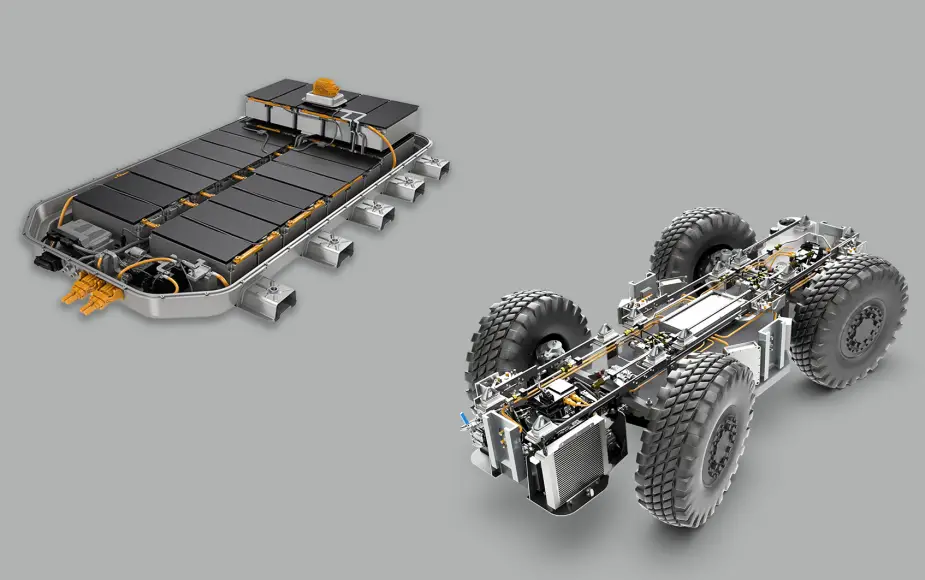European Defence Agency projects point to greater use of alternative power sources in military applications
The European Defence Agency (EDA) has successfully closed the first phase of two projects focused on harnessing the potential of lithium-ion technology and electrified powertrains in military platforms. The results of the two projects, ELUVAT and LITBAT I, sought to put alternative power sources to the unique tests demanded by operational requirements. They have respectively shown the feasibility of an advanced electrified powertrain to meet military demands and sought to broaden the use of lithium-ion battery systems in defence applications with a set of requirements for their use in a military setting and in future procurements.
Follow Army Recognition on Google News at this link

The European Defence Agency (EDA) has successfully closed the first phase of two projects focused on harnessing the potential of lithium-ion technology and electrified powertrains in military platforms (Picture source: EDA)
ELUVAT and LITBAT I are both prepared within EDA’s Capability and Technology Group "Ground Systems” and have been executed by a consortium composed of industrial and research entities from across Europe.
ELUVAT
ELUVAT I (Innovative electric light utility all-terrain vehicle for defence purposes), involves the development of an all-terrain electrical light utility vehicle based on an existing legacy vehicle with a conventional driveline, to be modified by introducing an advanced electrified powertrain with in-wheel electric motors.
In the first phase, involving Slovenia (lead), Austria, Germany and The Netherlands as contributing Member States and Switzerland, the concept has been developed and validated through simulation, which covered space claim, weight, and performance issues, and has compared the new powertrain with the conventional powertrain. Different options for the power source of the electrified powertrain have been considered: a dedicated hybrid internal combustion engine, a battery pack, and a Polymer electrolyte membrane (PEM) fuel cell to be operated by hydrogen.
The results of this first phase have made it possible to demonstrate the feasibility to meet operational requirements, highlighting critical issues and technological opportunities, and choosing the best architecture for the technology demonstrator that will be developed in the second phase.
The project also supports EU goals on energy efficiency and lowering the carbon footprint in the defence domain and is consistent with EU strategy on hydrogen, while also providing an opportunity for the development of dual-use applications.
LITBAT I
LITBAT I which focuses on safety concepts and safety features of lithium-ion batteries and standardisation of most common battery format for lithium-ion technology, involves Austria (lead) and Germany, as contributing Member States, and Switzerland.
The projects aim at providing Military End Users with a set of requirements as a basis for specifications to be used in future procurement procedures. As lithium-ion batteries have become a prevalent power source in military applications due to their superior energy density and long service life they can exhibit thermal runaway if subjected to misuse or accidents, resulting in the emission of flames.
Despite this potential drawback, the benefits of utilising lithium-ion batteries in military operations far outweigh the risks. During LITBAT I, military requirements have been systematically gathered, aligned, and analysed to derive design specifications for safer and more resistant lithium-ion battery systems. Based on the first phase’s results, a representative battery system for land platform applications will be developed and tested in a follow-on phase.
Pan-European Consortia
“ELUVAT I” has been executed by a consortium composed of eight industrial and research entities: the Austrian AVL List as project leader, the German AVL Schrick, the Swiss GDELS-Mowag, HyMove and Saluqi Motors from The Netherlands and AVL Slovenia, Elaphe Propulsion Technology and University of Ljubljana from Slovenia.
“LITBAT I” has been executed by a consortium composed of six industrial and research entities: the Austrian AVL List as project leader, AVL Schrick and ICT Fraunhofer from Germany and GDELS-MOWAG, Berner Fachhochschule and Armasuisse as Swiss partners.
Defense News March 2023


























